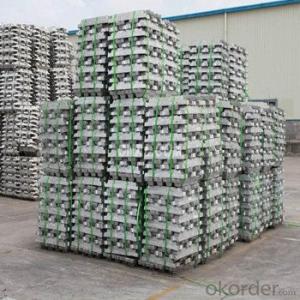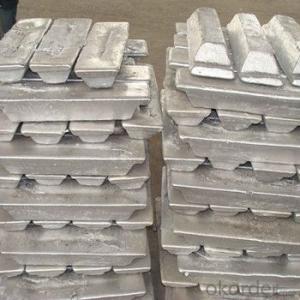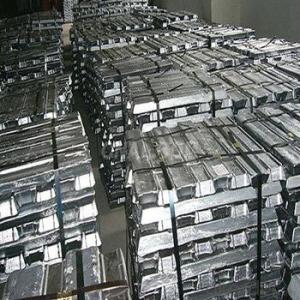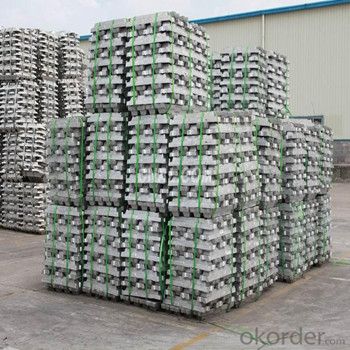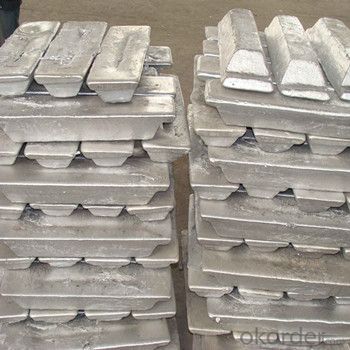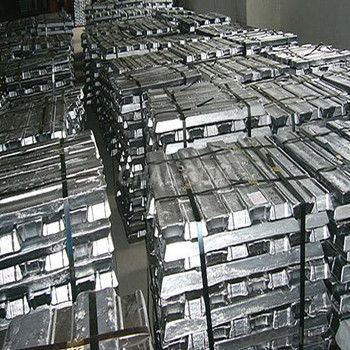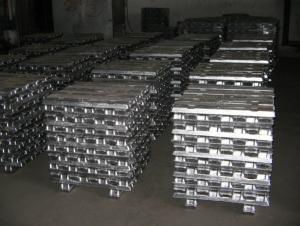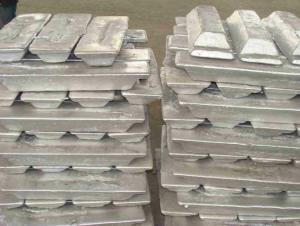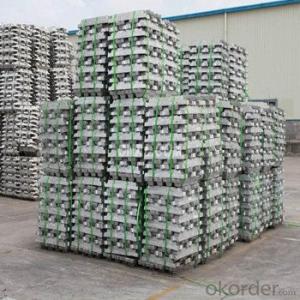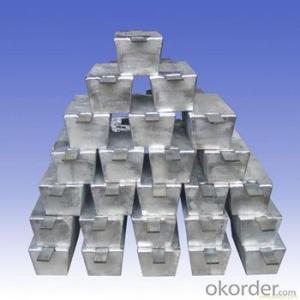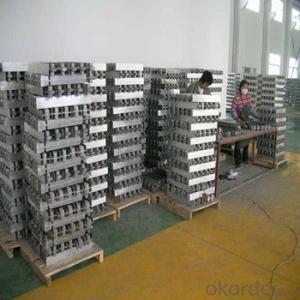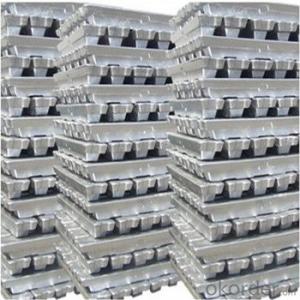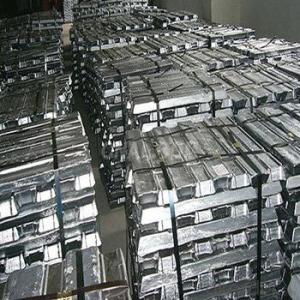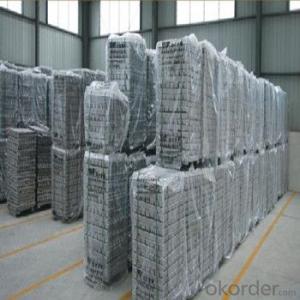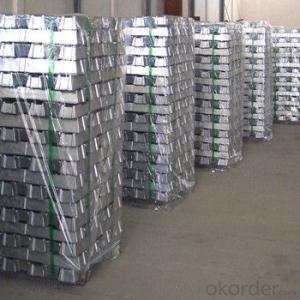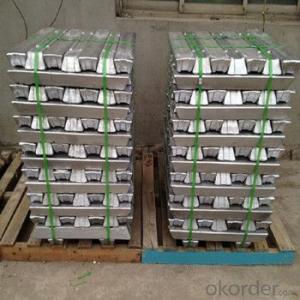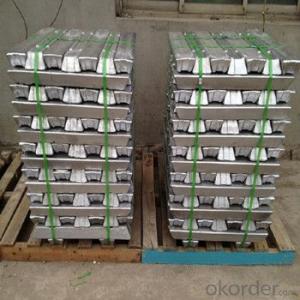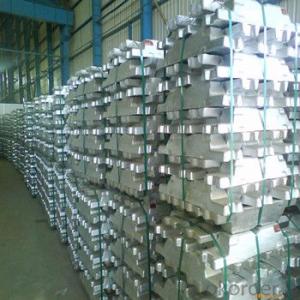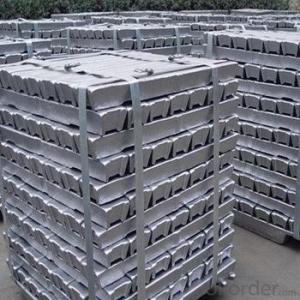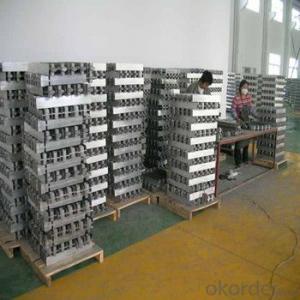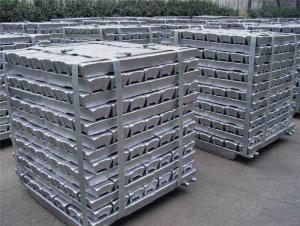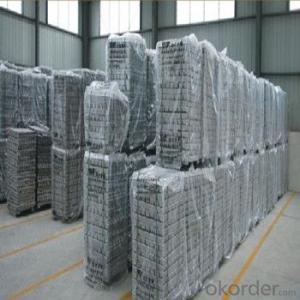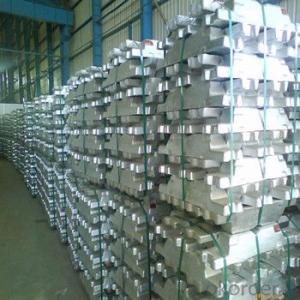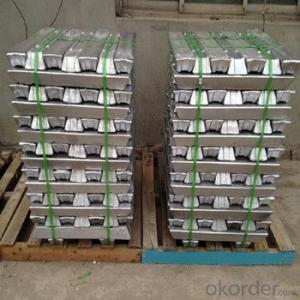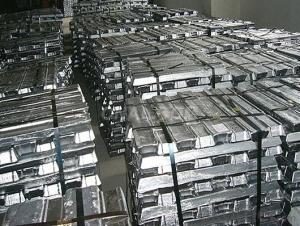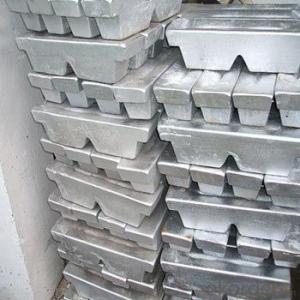Aluminum Pig/Ingot Used For Industry From China
- Loading Port:
- China main port
- Payment Terms:
- TT OR LC
- Min Order Qty:
- 1000 m.t.
- Supply Capability:
- 100000 m.t./month
OKorder Service Pledge
OKorder Financial Service
You Might Also Like
Pure Aluminum Pig/Ingot Used for Industry
1.Structure of Aluminum Pig/Ingot
A material that has been cast into a shape in order to be transported and processed easier than in an unprocessed form. An ingot is typically rectangular in shape, which allows it to be stacked. Ingots are most commonly associated with metals, with ingots of gold held in the vaults of banks and brokerages being popular images.
Aluminum Ingot is with the AL as the main chemical composition.Aluminum Ingot is used for industry,such as automobile,pinning and weaving,electron broadly and so on. Aluminum Ingot has the following advantages: easy control and operation, fast melting.
2.Main Features of the Aluminum Pig/Ingot
•High Purity
•Easy control and operation
•High strength
•Fast melting
•Competitive price
•Best Service
3.Aluminum Pig/Ingot Images
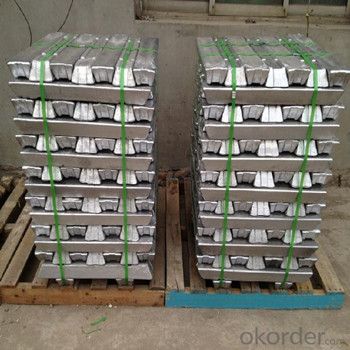
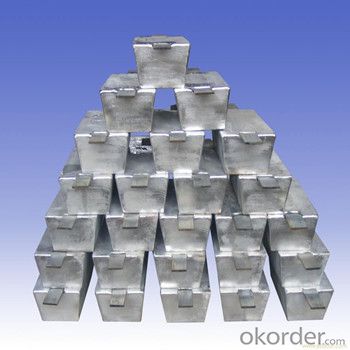
4.Aluminum Pig/Ingot Specification
Grade | Chemical Composition % | |||||||||
Al≥ | impurities ≤ | |||||||||
Si | Fe | Cu | Ga | Mg | Zn | Mn | others | Sum | ||
Al99.9 | 99.90 | 0.50 | 0.07 | 0.005 | 0.02 | 0.01 | 0.025 | - | 0.010 | 0.10 |
Al99.85 | 99.85 | 0.80 | 0.12 | 0.005 | 0.03 | 0.02 | 0.030 | - | 0.015 | 0.15 |
Al99.7 | 99.70 | 0.10 | 0.20 | 0.010 | 0.03 | 0.02 | 0.030 | - | 0.030 | 0.30 |
Al99.6 | 99.60 | 0.16 | 0.25 | 0.010 | 0.03 | 0.03 | 0.030 | - | 0.030 | 0.40 |
Al99.5 | 99.50 | 0.22 | 0.30 | 0.020 | 0.03 | 0.05 | 0.050 | - | 0.030 | 0.50 |
Al99.00 | 99.00 | 0.42 | 0.50 | 0.020 | 0.03 | 0.05 | 0.050 | - | 0.050 | 1.00 |
5.FAQ of Aluminum Pig/Ingot
We have organized several common questions for our clients,may help you sincerely:
①How about your company?
A reliable manufacturer & supplier of Aluminum Pig/Ingot,with many years’ experience in producing Aluminum Pig/Ingot.The items have beedn exported around the world,and have been acceptable among the customers,and have gotten the good reputation already.No matter from the quality,price and service,can be guaranteed for the cusgtomers.High purity and diffent grade are available.
②How to guarantee the quality of the products?
We have established the international advanced quality management system,every link from raw material to final product we have strict quality test;We resolutely put an end to unqualified products flowing into the market. At the same time, we will provide necessary follow-up service assurance.
③How long can we receive the product after purchase?
In the purchase of product within three wo We have organized several common questions for our clients,may help you sincerely:
- Q: Now refining aluminum ingot profits? What are the main factories?
- In general, the main customers are made of raw materials for the recycled aluminum plant. The price depends mainly on the composition and physical quality. This equipment is like a house to buy equipment and then to their masonry, generally dug a hole 2 meters deep, the pot material has 2 kinds, one kind is graphite, a cast iron, graphite is relatively better, Zhejiang has Yongkang sell, including tools, and this process is originated in the then, if you want to do better to the study, to be able to please the master.
- Q: How do aluminum ingots contribute to the overall aluminum industry?
- Aluminum ingots play a crucial role in the overall aluminum industry as they serve as the primary raw material for the production of various aluminum products. Ingots are formed by smelting aluminum ore and then pouring the molten metal into molds to solidify. One significant contribution of aluminum ingots is their versatility. They can be further processed and shaped into different forms, such as sheets, plates, rods, tubes, and extrusions, which are used in a wide range of industries. These include automotive, aerospace, construction, packaging, electrical, and consumer goods sectors. Furthermore, aluminum ingots offer several advantages that contribute to the growth and sustainability of the aluminum industry. Aluminum is lightweight, corrosion-resistant, and possesses excellent conductivity, making it an ideal choice for many applications. Its low density allows for energy efficiency in transportation, reducing fuel consumption and emissions in the automotive and aviation sectors. Additionally, aluminum's corrosion resistance ensures longer-lasting products, reducing maintenance and replacement costs. The availability and affordability of aluminum ingots also contribute to the overall aluminum industry. Aluminum is the third most abundant element on Earth's crust and can be easily extracted from bauxite ore. This accessibility, combined with efficient production processes, makes aluminum ingots readily available for manufacturers at competitive prices, stimulating demand and market growth. Moreover, the recycling potential of aluminum ingots plays a significant role in the sustainability of the aluminum industry. Aluminum is infinitely recyclable, meaning it can be melted and reused without any loss in quality. Recycling aluminum requires only a fraction of the energy compared to primary production, resulting in significant energy savings and reduced environmental impact. The use of recycled aluminum ingots helps in conserving natural resources, reducing waste, and lowering carbon emissions. In conclusion, aluminum ingots are essential to the overall aluminum industry as they provide the raw material that is processed into a wide variety of aluminum products. Their versatility, lightweight nature, corrosion resistance, and recyclability make them highly valuable for multiple industries. The availability and affordability of aluminum ingots further contribute to the growth and sustainability of the aluminum industry, while their recycling potential helps in conserving resources and reducing environmental impact.
- Q: What is the re ingot?Please give me a detailed explanation
- Of course, some people do not cast ingots complex, he will cast silicon, aluminum water and how many percent how many turns into a silicon ingot casting furnace, and then sold to the inside of the ingot, the content inside the complex ingot is to know what tests!
- Q: What does aluminium ingot blacken because of temperature? Rain? Aluminium oxide? Iron salt?
- Oxidized by oxygen; alumina
- Q: What is the role of aluminum ingots in the production of cans?
- The role of aluminum ingots in the production of cans is crucial. Aluminum ingots are the primary raw material used in the manufacturing process of aluminum cans. These ingots are melted down and then formed into the desired shape and size of the can. Aluminum is chosen as the material for cans due to its unique properties. It is lightweight, making it easier to transport and handle. It is also highly durable and resistant to corrosion, ensuring the cans can protect the contents inside. Once the aluminum ingots are melted and formed, they go through a series of processes to create the final can. This includes shaping, forming, and coating the can to ensure it is strong and can withstand the pressure from carbonated beverages. Additionally, aluminum ingots allow for easy recycling of cans. Aluminum is a highly recyclable material, and using ingots in the production process ensures that cans can be recycled and reused multiple times without compromising their quality. In summary, aluminum ingots play a vital role in the production of cans. They provide the necessary raw material for creating lightweight, durable, and recyclable containers that are widely used in the beverage industry.
- Q: Who knows, general aluminium ingot has those specifications?
- Several common aluminum ingotAluminum ingots for remelting --15kg (99.80%Al, 20kg):T shaped aluminum ingot --500kg, 1000kg (99.80%Al):High purity aluminium ingot --l0kg, 15kg (99.90% ~ 99.999%Al);Aluminium alloy ingots --10kg, 15kg (Al--Si, Al--Cu, Al--Mg);Slab --500 to 1000kg (for plate making);Round ingot --30 to 60kg (wire drawing).
- Q: How to calculate the price with or without ticket in the aluminum ingot trade? Does the invoice price increase with aluminum?
- As to whether the invoice price fluctuates with the fluctuation of the aluminium ingot price, this is also the prior agreement between the seller and the buyer. Generally, the bulk of the sensitive price goods will be agreed on a floating price, that is, the price of the settlement, the market price of floating and floating.
- Q: What is the purity level of aluminum in an ingot?
- The purity level of aluminum in an ingot can vary depending on the specific manufacturing process and the intended application. Generally, aluminum ingots are produced with a purity level of 99.7% to 99.9%. This means that the ingot is composed of at least 99.7% to 99.9% pure aluminum, with the remaining percentage being made up of impurities and trace elements. Achieving higher levels of purity, such as 99.99% or even 99.999%, is possible through additional refining processes like electrolysis. The desired purity level is determined by the specific industry or application in which the aluminum will be used, as certain industries may require higher levels of purity for optimal performance and quality.
- Q: How are aluminum ingots used in the production of heat sinks?
- Heat sinks, which are crucial in dissipating heat generated by electronic devices, heavily rely on aluminum ingots. Aluminum is favored for heat sinks due to its exceptional thermal conductivity, lightweight properties, and cost-effectiveness. The initial step involves melting aluminum ingots and casting them into the desired shape and size of the heat sink. The ingots are heated to their melting point, typically around 660 degrees Celsius, and then poured into molds to create the initial shape. Once the heat sink shape is formed, it undergoes various machining processes such as milling, drilling, and cutting. These processes are necessary to generate the required fins and surface area for efficient heat dissipation. By increasing the surface area, the heat sink allows for better air circulation and heat transfer. After the initial shaping and machining, the heat sink often undergoes surface finishes or coatings. These treatments aim to enhance its thermal properties and protect it from corrosion. Examples of these finishes include anodizing, which forms a protective oxide layer, and electroplating, which improves appearance and durability. Once manufactured, the heat sink is typically attached to the electronic device using thermal interface materials like thermal paste or pads. These materials maximize the contact between the heat sink and the electronic component, ensuring efficient heat transfer. In summary, aluminum ingots are indispensable in heat sink production. They provide the necessary material for creating heat sinks with outstanding thermal conductivity, light weight, and cost-effectiveness. The use of aluminum ingots in heat sink production significantly improves the performance and reliability of electronic devices, effectively dissipating heat and preventing overheating.
- Q: What are the challenges in sourcing sustainable aluminum ingots?
- Sourcing sustainable aluminum ingots presents various challenges. One of the primary obstacles involves ensuring that the aluminum is produced in an environmentally-conscious manner. This entails minimizing energy consumption and carbon emissions linked to the production process. Many aluminum smelters still rely on fossil fuels for energy, which has a significant detrimental effect on the environment. Another challenge lies in verifying the origin of the aluminum. It is crucial to guarantee that the raw materials used in ingot production are ethically sourced and not associated with deforestation, human rights abuses, or conflict zones. This necessitates a robust and transparent supply chain capable of tracing the aluminum back to its source. Additionally, the issue of waste and recycling needs to be addressed. Aluminum is highly recyclable, but significant amounts of aluminum waste still end up in landfills. Encouraging and incentivizing aluminum recycling is vital to mitigate the environmental impact of its production. Furthermore, the availability of sustainable aluminum ingots can be limited. Not all aluminum producers have adopted sustainable practices, resulting in a lack of supply in certain regions or industries. This poses a consistent challenge for businesses seeking to source sustainable aluminum ingots. Overall, addressing these challenges is essential to promote an environmentally-friendly and responsible aluminum industry. By striving for sustainable sourcing practices, we can minimize the environmental impact of aluminum production and contribute to a more sustainable future.
Send your message to us
Aluminum Pig/Ingot Used For Industry From China
- Loading Port:
- China main port
- Payment Terms:
- TT OR LC
- Min Order Qty:
- 1000 m.t.
- Supply Capability:
- 100000 m.t./month
OKorder Service Pledge
OKorder Financial Service
Similar products
Hot products
Hot Searches
